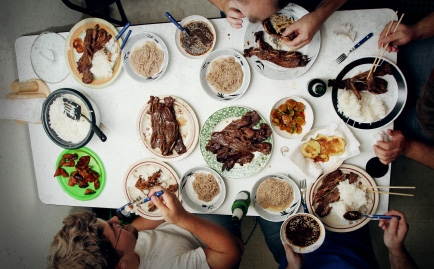We’re simple folk, really. My branch of the Zimmerman family is decidedly Midwestern—we don’t venture beyond a short drive to the Iowa border without good reason. And there’s a dash of farmer blood in us for good measure; my mom grew up on a “century farm” (a farm that stayed in the same family for more than a hundred years) in Allamakee County in northeastern Iowa, and we made regular treks there throughout my childhood. Iowa is the land of the oft-repeated joke, the only state I know of in which children in Halloween costumes are expected to perform for their prize. Pity the poor parent trudging from house to house every October 31, listening to their sugar-buzzed four-year-old tell the same knock-knock joke over and over and over and over and over. It’s in Iowan blood to find something funny and stick with it. That’s why, for the entirety of my life, I’ve heard my parents assign virtually every modest or misdirected effort at creativity the same wry, backhanded compliment.
The origins of the comment come from sometime during the Richard Nixon administration. My mom and dad came home to find that a car-full of second- or third-cousins with a truckload of moxie had shown up unannounced and set up shop in our kitchen while my dad was at work and my mom was down the street visiting a friend. They’d be staying for dinner. No time to prepare something fabulous; to grill steaks or bake meatloaf or whip up a pie filling, to mix and roll out and shape a pie crust. No biggie, though. My forward-thinking mother had cans of tuna, which she mixed into tuna salad and dolloped out on English muffins. And she had a pumpkin pie tucked away in the freezer, left over from Thanksgiving.
Anytime other than Thanksgiving, of course, pumpkin pie is a curiosity, a conversation starter. Can a dish so tethered to one day of the year really satisfy at any other time? Everyone took a deep breath, mustered up their courage and dutifully brought a forkful to their mouth.
“Not bad,” our well-intentioned but poorly raised diner offered as a dispensation of civility. “For frozen pumpkin pie,” he added almost by accident. It stuck.
Since then, my parents have celebrated every good intention gone bad with a knowing glance, a crooked smile and the same wry, backhanded compliment: “Not bad for frozen pumpkin pie.” Even though it rarely gets a laugh these days, I still find it profoundly funny.
These days, of course, the phrase is caked in irony. Everything from breakfast to dinner, from soup to nuts, is frozen these days. Except for Thanksgiving. At Thanksgiving we’re not thrown into confusion by the arrival of guests. Instead we’re reminded how woefully inadequate a pre-fab, quick-serve life can be. We’re not reminded in woeful ways, though; we’re rather presented with an alternate vision of reality, a life beyond the frozen-food aisle. At Thanksgiving the food is the event. People pore over their food, both in the dining and the preparation. We set aside hours, sometimes days, to prepare a Thanksgiving meal. Everyone borrows ideas and recipes from each other to create their own special spread; everyone who comes together on that day contributes a little bit, whether peeling potatoes or baking bread.
My parents recently heard a first-time home buyer complain about the dining room in his new house: “That’s for old people.” In a way he’s right; bygone is the era of the never-frozen food—of meals eaten in direct, not peripheral view, of people we love and enjoy, with all the time in the world to enjoy ourselves and one another, not to mention our five basic food groups. On Thanksgiving, however, though the weather outside may be cool and overcast, our hearts are warmed by what Sufjan Stevens calls “the sense of each other.” We are reminded at least once a year that while scarcity so often dominates our private imaginations, life together is, in reality, an occasion of abundance. Not bad for one meal.
David A. Zimmerman is author of Deliver Us from Me-Ville (David C. Cook) and Comic Book Character (IVP). He writes the column “Becoming the Great Us” for the Burnside Writers Collective.






















